
18 minute read
LEGAL
LEGAL ALTERNATIVE FUNDING OPTIONS for Houston's Small Businesses
By Subcontractors USA News Provider
Since the onset of the COVID-19 pandemic, businesses of all sizes in nearly every sector are facing financial hardship brought on by the crisis.
As the economy gradually reopens, local and state orders with restrictions on business operations have presented challenges for business continuity, especially for small to medium sized-enterprises. While legislators have made record emergency funds available through federally-backed programs, including the Small Business Administration’s (SBA) Economic Injury Disaster Loans and the Paycheck Protection Program (PPP) established by the CARES Act, access to that funding goes quickly and has proven difficult for many small businesses to attain.
To address the growing concern of securing small business funding, three Houston financial experts joined a virtual Partnership Small Biz Matters Business Resource Group meeting to explain the programs and resources available to small businesses and nonprofits seeking capital to maintain business operations.
LiftFund
Since COVID-19 struck, LiftFund has supported small businesses across more than a dozen states. The community development organization has provided more than 800 relief loans totaling $23 million in funding and nearly 200 small business grants totaling over $1.6 million.
Richard Gianni, Senior Executive Vice President of Micro-lending for LiftFund, explained its mission is to support small businesses who have limited access to traditional resources and provide financial support through funding partnerships with municipalities and community partners.
LiftFund is an SBA-approved PPP lender and has provided more than $4 million in PPP loans to Houston entrepreneurs. In addition to offering PPP loans, LiftFund has established additional COVID-19 relief funding, offering loans up to $50,000 with a favorable interest rate and a 120-day deferment period.
Gianni stressed that while capital and liquidity is imperative to business continuity, business acumen is equally important during a crisis. LiftFunds offers a variety of business support services, including virtual learning opportunities, individualized business support and an on-demand learning platform that offers tutorials around money, management and marketing. Gianni said that LiftFund’s business support programs help small businesses leverage capital and make strategic decisions that are critical to navigating turbulent times.
More at liftfund.com
Greater Houston Community Foundation
In late March, the Greater Houston Community Foundation (GHCF), in partnership with the United Way of Greater Houston, established the Greater Houston COVID-19 Recovery Fund to support the region’s most vulnerable communities impacted by the pandemic.
Jennifer Touchet, Vice President of Personal & Family Philanthropy at GHCF, said the fund has raised $14 million dollars to provide nearly 30 grants to nonprofit organizations providing food assistance, rental assistance and counseling for disproportionately impacted communities in Harris, Fort Bed, Montgomery and Waller Counties. To date, $2.2 million has been granted. Additional nonprofit organization grants are expected to be released in late May.
Touchet said in addition to directing philanthropic funds to organizations providing much-needed services for those affected by the crisis, the GHCF also provides critical dashboards that enable nonprofits providing these services to make data-based decisions based on what communities need most. The Nonprofit Needs Data Dashboard is an interactive platform that summarizes the services, needs and populations served of nearly 80 local nonprofits to help guide how money is allocated. The GHCF also provides a COVID-19 Nonprofit Inquiry Form for nonprofits to help other organizations understand the needs of households affected by COVID-19. These tools help other organizations and funders garner support for those disproportionately affected by the crisis.
More at greaterhoustonrecovery.org
NextSeed
NextSeed aims to build prosperous communities by making meaningful investments accessible to everyone and empowering everyday investors to invest directly in local businesses through crowdfunding. In response to the COVID-19 crisis, NextSeed launched The NextSeed Community Bridge Note, which offers flexible crowdfunded working capital financing for small businesses who are negatively impacted by the pandemic.
NextSeed’s Co-Head of Investment Banking, Jovan Vojvodic, said the SEC announced that it was providing temporary relief to expedite crowdfunding offerings earlier this Month, which typically calls for long campaign times and CPA-reviewed financial statements. Under these temporary changes to regulated crowdfunding offerings, campaigns only need to remain open for 48 hours and businesses are no longer required to provide third-party CPA-reviewed financials up to $250,000. The previous threshold was $107,000. These changes are in effect for offerings launched before August 31, 2020.
Vojvodic said that by leveraging the SEC’s temporary relief, NextSeed is able to provide small businesses with an alternative to raise flexible, lower cost, lower fee financing to meet their working capital needs during and in the immediate aftermath of COVID-19. Vojvodic added that by investing in these notes, investors can participate in the recovery and the eventual return to growth of businesses they care about.
Source: Greater Houston Partnership
LEGAL Office of Business Opportunity Collaborates with Law Firms to Provide Free Legal Advice to Small Businesses
By Subcontractors USA News Provider
Small businesses impacted by the COVID-19 pandemic now have a resource for free legal advice, thanks to the Houston Small Business Legal Consultations (HSBLC) Program in collaboration with the City of Houston’s Office of Business Opportunity (OBO), Vinson & Elkins (V&E) and several private law firms.
Through a network of volunteer attorneys, HSBLC will provide participants free legal consultations, by telephone, about how to navigate loan and grant relief programs, taxes, commercial leases, contracts, employment, intellectual property and other general business issues. In addition to V&E, who with OBO, led coordination of this program, participating firms include Akin Gump, Arnold & Porter, Blank Rome, DLA Piper, Fish & Richardson, Greenberg Traurig, Hunton Andrews Kurth, Kilpatrick Townsend, Kirkland & Ellis, Latham & Watkins, Mayer Brown, Morgan Lewis, Norton Rose Fulbright, Orrick, Perkins Coie, Sidley Austin, Simpson Thacher, Weil, Gotshal & Manges, and Willkie Farr & Gallagher LLP.
To be eligible for the program, you must be self-employed, or be an owner or representative of a small business or non-profit organization. Information about how the business has been affected by the pandemic must be provided. After a screening process, the business will be matched with a volunteer attorney from one of the participating law firms, who will try to offer guidance. All consultations are confidential to the full extent permitted by law.
“We are thrilled to be collaborating with the City of Houston and so many national firms to help Houston’s small business community," said Ellyn Haikin Josef, pro bono counsel at V&E. "In these uncertain and scary times, we want to make sure these businesses have access to as many answers as we can give them.”
HSBLC is an extension of Virtual Legal Lab, a program previously created by OBO and V&E that allowed small business owners to visit OBO onsite to participate in oneon-one virtual consultations with a licensed attorney. With social distancing measures in place, HSBLC allows the no-contact continuation of these legal consultations.
“What started as Virtual Legal Lab with two entities now includes a larger network of law firms who are committed to assisting the small business community in these challenging times,” said Marsha Murray, Office of Business Opportunity director. “With small businesses facing existential threats during this pandemic, we encourage those who need this service to reach out.”
Click here to fill out an application form, or call 832-393-0652 to learn more about the HSBLC program.

By Subcontractors USA for women in construction,” Lee said. “It indicated that they had been over utilized. News Provider Prior to this, we had an SBE program for O n July 1, Dallas-Fort Worth International Airport is debuting their newly revised Minority/Women goods and services out of procurement, and we had a MBE program for just construction and MWBE for professional services Business Enterprise Program, which Tranand construction related services. Now, it sitioned from an SBE Program for Conis just one MWBE program for everything, struction under $1 million and Goods and which includes: general goods and services, Services to all local programs M/WBE construction related professional services,
“Anyone that wants construction services, legal, treasury, third to run an MWBE program needs a legal justification to have the pro“It is important that gram,” Tamela Lee, Vice Presiwe bring diversity dent of Business Diversity and Deamong our supplier velopment at DFW, said. “So we commisand construction group sioned a disparity study, and after the study was to employ opportunities to complete and the findings were released, it was MWBEs who we know will do recommended that we do an MWBE program. a great job.” The Board adopted the revised version of the -Tamela Lee, program on January 9 and it will go into effect on July 1.” Vice President of Business Diversity and Development
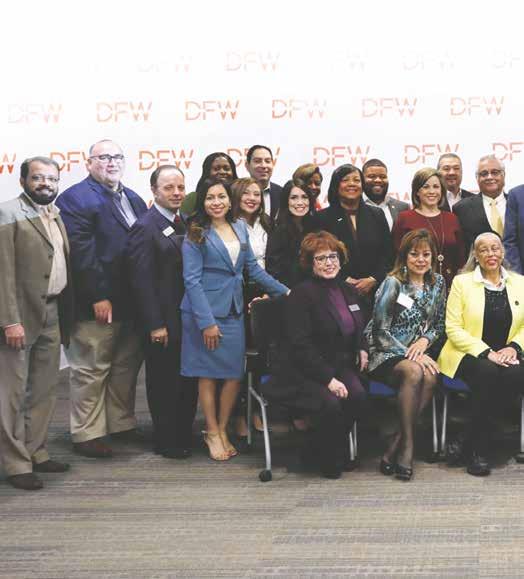
There are three basic changes differing the new MWBE Program from the former: 1. DFW transitioned from an SBE Program for construction under a million dollars to all of the programs now being MWBEs. There is no longer an SBE program. 2. All MWBE annual goals were amended to fit the findings of the disparity study. 3. The relevant area market was reduced from 12 to four counties: Collin, Dallas, Denton and Tarrant.
“The last study we had didn’t really allow construction under a million and all of our

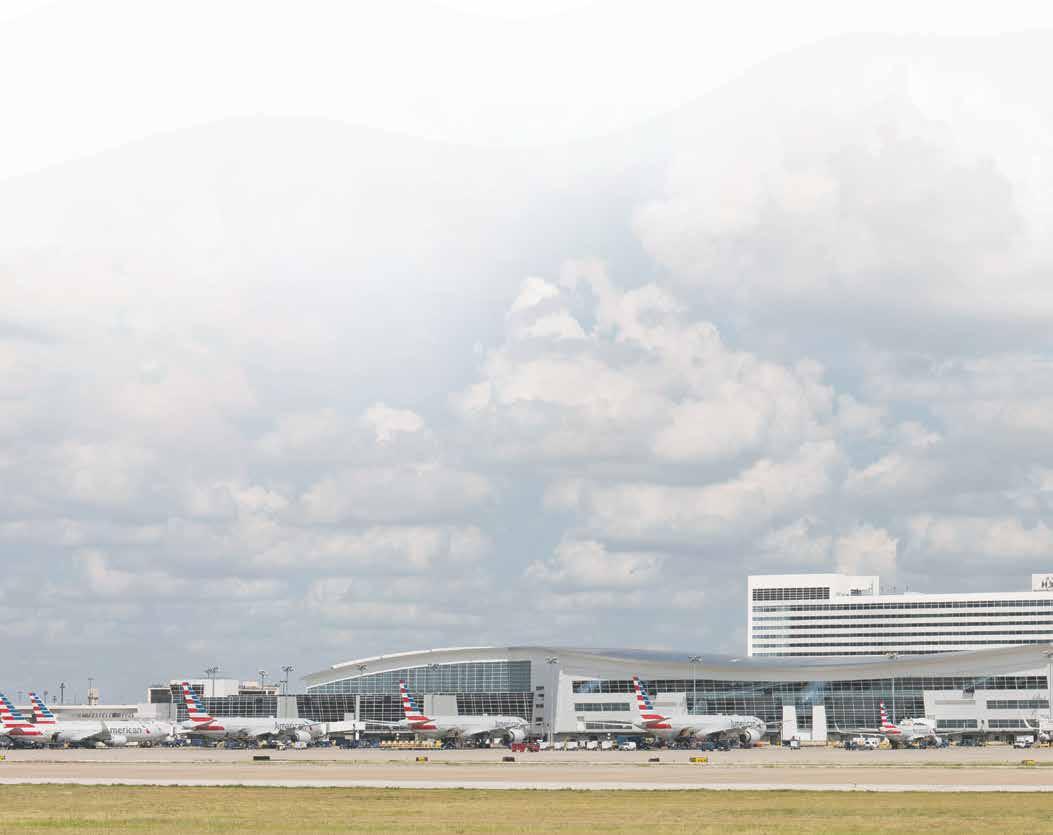
party commercial development and third party concession tenant finish outs. That excludes our federal programs that we still have to run for Airport Concessions Disadvantaged Business Enterprise Program and our Disadvantaged Business Enterprise for federal programs.”
Another change that has been implemented is to the contracts. Many of them start off under $50,000, and the MWBE program only ap

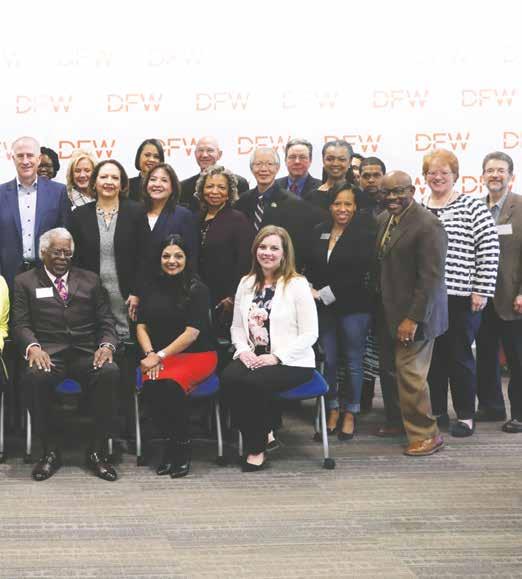
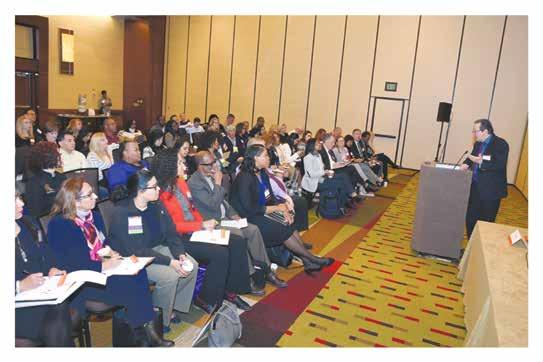
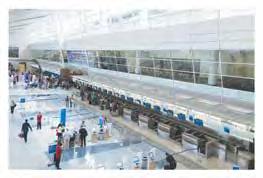
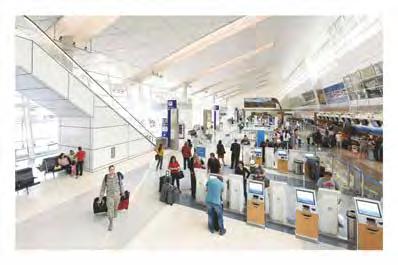
plies to contracts over $50,000. So, in line with being more inclusive, the under $50,000 contracts that increase in value are reevaluated and can apply to MWBEs when they reach the over $50,000 mark. This helps ensure that minority and women-owned businesses in North Texas are getting hired for these jobs.
Businesses interested in doing business with the airport through the MWBE Program must be certified as a women or minority-owned business through the North Central Texas Regional Certification Agency, Women’s Business Council or DFW Minority Supplier Development Council. There is no personal net worth or size standard requirement.
“The most important thing the disparity study showed us was that there are still discriminatory practices in the marketplace that prevent MWBEs from getting business opportunities,” Lee said. “If we were to list a solicitation with no goals to meet, I can guarantee there would be no minority or womenowned businesses used on the job. So, it is important that we bring diversity among our supplier and construction group to employ opportunities to MWBEs who we know will do a great job.” As an airport, DFW values diversity, and they can ensure they do everything possible to carry the MWBE program all the way through. They look at important points like bringing a diverse team but also if these teams are being paid properly and timely. There can be unfortunate actions for those that do not meet their commitment to the airport such as no longer being able to bid with the airport. The commitment is to growing the MWBE Program and doing more than just saying “Yes, we do have an MWBE Program.” Despite the COVID-19 pandemic, DFW has continued to be avid in their outreach to the MWBE community. Virtually, they have continued to work w ith Minority and Women Chambers and contractor associations in the area as well as hold concession forums, forums with Prime contractors and M/WBEs.. In their Capacity Building series, they have seen attendance grow from an average of 40-50 attendees to over 150 attendees since going virtual.
Lee says that for this MWBE Program to be a success, it must achieve four things: 1. The set goals are exceeded. 2. There are new entrees into the program as a result of the program. Those who have never had an opportunity to work with the airport now have that opportunity. 3. Building capacity. DFW wants this program to grow, which is the intent of the Capacity Building series, a series that helps people know how to actually do business with the airport. 4. O nce some MWBEs grow in capacity and are able to compete as Primes instead of subcontractors, they are continuing to reach out and do business with other MWBEs.
“At the end of the day, it would be nice if these programs did not even have to exist because that would mean there was no discrimination in the marketplace,” Lee said. “But until then, we certainly want to encourage MWBEs to get into the business and grow their capacity so they can get larger and have more opportunity.”
For more information, visit: www.dfwairport.com/bdd/
OIL AND GAS
ConocoPhillips focuses on its core job and values during COVID-19
By Subcontractors USA • 6,500 respirator masks donated to local area hospitals News Provider and first responders in Houston, Texas; Casper, Wyoming; and Riverton, Wyoming. onocoPhillips is taking steps to support and sustain its global workforce, communities and health care professionals during the coronavirus pandemic. With thousands of its people workC • 6,000 pairs of medical exam gloves donated to medical centers and first responders in Odessa, Texas; Andrews, Texas; and Casper, Wyoming. ing from home and thousands more practicing social • 100 pairs of safety and reading glasses donated to distancing in the field, the company is focused on its first responders in Casper, Wyoming. core job: to safely find and deliver energy to the world.
“Throughout our global operations everything we’re • Dozens of lunches delivered to the staff at Stavanger doing comes from our core values: protect our peoUniversity Hospital in Norway. ple, stop the spread of the virus and safely run the business. Our workforce has stepped up. People are aligned activating plans and communicating. Our Throughout our global operations everything • Gloves, visors and protective masks donated to the staff at James Cook University Hospital in Middlesbrough, U.K. people are getting the job done while protectwe’re doing comes • $25,000 donated to Camp Fire Alaska for ing themselves and emergency program others,” said ConocoPhillips Chairman and from our core values: services benefiting local children of acCEO Ryan Lance. “Throughout our global operations everything we’re doing comes from our core protect our people, stop the spread of the tive duty and deployed military personnel and $10,000 to the Children’s Lunchbox for meals to youth in low income neighborhoods. values: protect our people, stop the spread virus and safely run • 500 personal hand of the virus and safely run the business.” — Ryan Lance, the business.” sanitizers for area first responders Karnes and DeWitt, Texas Conocophillips Chairman And Ceo At production facilities around the world, operations continue under stringent clean— Ryan Lance, Conocophillips Chairman And Ceo • ConocoPhillips Chinese American employees purchased a secure shipment from China and delivered 4,500 masks and 200 ing and social distancing measures. protective gowns to several Houston hospitals and
Office employees in all locations including its Houfirst responders. ston headquarters are working from home.
As a result, ConocoPhillips continues to deliver the • Employee volunteer Connie Carter donated her time oil and natural gas that is essential to keep society to make 300 cloth masks for local businesses and first running through the ongoing crisis. responders in Watford City, ND. Hear Connie in a podcast
Meanwhile, ConocoPhillips’ business units and coron Faces of ConocoPhillips porate groups are donating much-needed relief aid, food and medical supplies to area hospitals and first responders to help in the fight against the coronavirus. While the situation continues to unfold, here’s a • Donated personal protective equipment, including masks and gloves valued at $10,000 USD, to local hospitals and clinics in Jakarta and the local regency (MUBA) in Indonesia.
summary of the company’s community support
activities as of April 10, 2020: • $300,000 USD donated to procure life-saving medical supplies and support front-line medical personnel in Wuhan, China. In the days ahead, spiritnow will continue to publish news and information on ConocoPhillips’ response to the coronavirus pandemic.
OIL AND GAS Employment in Texas’ Upstream Oil and Natural Gas Activities Impacted by Pandemic
By Subcontractors USA News Provider
Data from the Workforce Commission indicates that employment in Texas’ upstream oil and natural gas activities fell significantly in April.
Compared to March 2020 levels, April upstream employment was down by 25,800 jobs. Compared to the same month in 2019, April 2020 jobs were down 47,200, or 20%. At a total of 192,600 jobs, this was the first time for upstream jobs to number fewer than 200,000 since January 2017. The April 2020 upstream job count now essentially matches the low point of September 2016, which was 192,400 jobs. These jobs pay among the highest wages in Texas.
Todd Staples, president of the Texas Oil & Gas Association, said, “This current crisis is impacting every sector of the oil and natural gas industry, and unfortunately, many companies are required to make difficult decisions as they adjust to the market circumstances. The Texas oil and natural gas industry has positioned itself to manage through the world-wide disruption by immediately announcing rig reductions, curtailing planned capital expenditures for 2020 by over $60 billion and counting, shutting in actual production and by pursuing innovative storage expansion. While many of these necessary reductions have negatively impacted workforce levels, the industry is poised to rebound as the world economy gets back on track and supply/demand levels normalize. We look forward to expanding the employment levels as market conditions allow.”
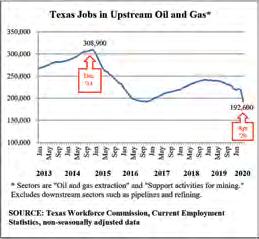
Oil and natural gas extraction is upstream activity, meaning that it excludes other sectors in the industry such as refining, petrochemicals, fuels wholesaling, oilfield equipment manufacturing, pipelines, and gas utilities. The employment shown also includes “Support Activities for Mining,” which is mostly oil and natural gas-related but includes some small amount of other types of mining, also.
Of the year-over-year loss of 47,200 jobs, the lion’s share was in the “Support Activities of Mining” sector, mostly service companies. April 2020 employment by these companies was down 26% compared to the same month, prior year. For “Oil and Gas Extraction,” which is mostly operators, the year-over-year decline was just 6%.
The “Petroleum and Coal Products Manufacturing,” a subsection of the downstream sector, lost 1,400 jobs (6%) in April 2020 compared to March, an unusual job swing for this sector.

OIL AND GAS Railroad Commission Launches Drone Program to Enhance Emergency Response
By Subcontractors USA News Provider
Taking advantage of 21st century technology, the Railroad Commission of Texas launched a statewide drone inspection team last month. Drones will help inspectors to quickly respond and inspect sites that are unsafe or inaccessible during emergencies such as fires, flooding and other natural disasters. Drones can also assist in situations, such as the current COVID-19 pandemic, where they provide an alternative to in-person inspections.
The RRC’s first drone emergency response was April 28 following reports of an incident in Reeves County west of Midland. The affected area could not be physically inspected because the road to the site was under water.
A licensed RRC pilot launched a drone and determined a possible source of release using aerial and thermal images. The operator was contacted to immediately remediate the site. Several drone images from the response are below.
“Our very first flight mission in Reeves County is a great example of how drones will enable inspectors to do their jobs quickly and safely in emergencies, which ultimately helps further protect residents and the environment,” said RRC’s Executive Director Wei Wang. “Whether it’s through information technology or other new tools, the Commission has always been looking at ways to enhance our operational efficiency. With
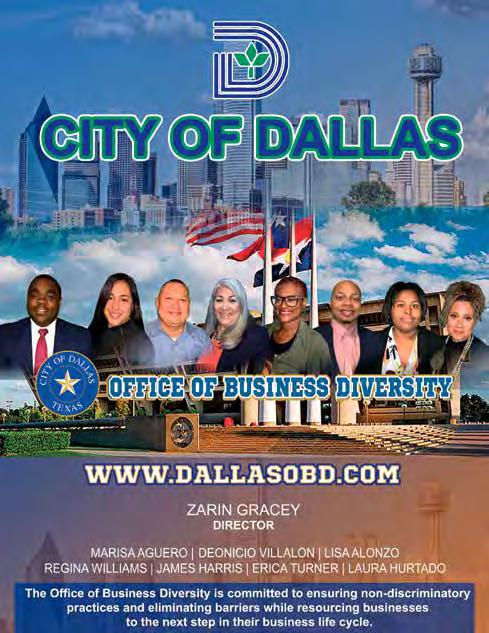

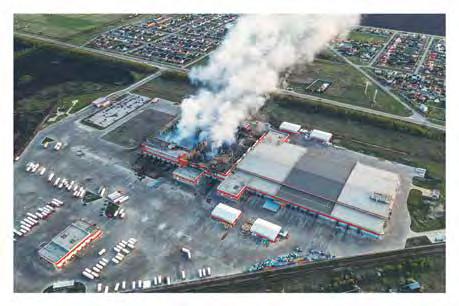
drones, our inspectors can now immediately monitor well blowouts, oil spills, and other emergency incidents, and quickly cover large
areas of ground in responding to those situations where time is of the essence.” Nineteen inspectors in the agency’s Oil and Gas Division and Surface Mining and Reclamation Division (SMRD) have received remote pilot certification from the Federal Aviation Administration. Beginning this summer, SMRD will use drones for emergency responses and inspections. Drones can document the progression of mining in active operations which can change drastically from month to month. Aerial images will also help in the oversight of reclamation activities in previously mined areas. The RRC’s drone program will operate in compliance with the Code of
Federal Regulations as well as state laws established to ensure safety and the protection of individual and property owners’ privacy.
The RRC is also a member of the State Emergency Operations Center. The agency’s drone fleet can be a critical resource in helping state emergency response by providing aerial views of inaccessible areas.
A list of frequently asked questions (FAQ) and answers is also on the RRC’s Drone Program page at https://rrc.texas.gov/about-us/ organization-activities/drones/.
Source: Texas Railroad Commission







